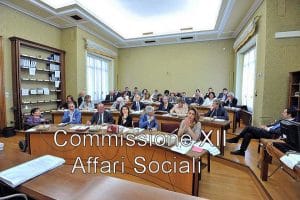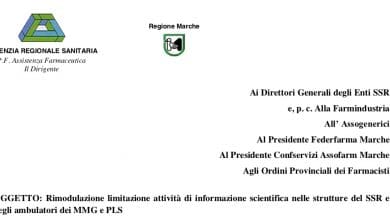
Reform of legislation on clinical trials of drugs, review of ethics committees, gender medicine, professional orders and new professions.
25 October 2017 – Echo from the Palaces
These are just some of the points contained in the Lorenzin bill, approved by the Chamber and which will now have to return to the Senate for its third parliamentary reading. The measure, of government origin but dating back to the Letta Government, has been greatly modified in this parliamentary passage. Among the main changes is the reform of the ethics committees, which must number a maximum of forty, with at least one committee for each region, taking into account, however, the reorganization of the ethics committees, as envisaged by Legislative Decree 158 of 2012, and the number of trials evaluated as of coordinating center during 2016. An ad hoc article was also introduced for the dissemination of gender medicine. To circumvent the enormous amount of amendments that the Social Affairs Committee asked for the establishment of new health professions, a new procedure has been introduced for the recognition of new professions, which will also be accessible to professional associations. Another novelty crackdown on the abusive practice of the profession, with sentences of up to 5 years in prison and a fine of 75 thousand euros, not only for the health professions. Finally, the article on pharmacies and parapharmacies has been eliminated. Here are the details of the measures envisaged by the bill:
DRUG EXPERIMENTATION REFORM Within 12 months from the date of entry into force of the provision, the Government will have to issue one or more legislative decrees for the reorganization and reform of the rules on clinical trials of medicines for human use, introducing a specific reference to gender medicine and pediatric age. The implementing legislative decree, among other things, will have to identify the requirements of the centers authorized to conduct clinical trials from phase I to phase IV, with particular attention, in phase IV, to the involvement of patient representative associations in the definition of protocols of research, especially for rare diseases. Procedures for public accreditation and annual monitoring of the requirements possessed. Furthermore, methods must be identified to support the activation and optimization of clinical centers dedicated to phase I clinical trials, both on patients and on healthy volunteers, to be conducted with a methodological approach of gender medicine, also providing for the definition of minimum requirements for the same centres. The independence of the clinical trial and the absence of conflicts of interest must be guaranteed. Furthermore, the simplification of procedures for the use for clinical research purposes of residual biological or clinical material from previous diagnostic or therapeutic activities or in any other capacity must be envisaged, "having previously obtained the patient's informed consent on the use of the biological material that directly concerns him“.
Furthermore the Government will have to rewrite the procedures for evaluating and authorizing a clinical trial, ensuring the involvement of patient associations, especially in the case of rare diseases, through: identification of the role of the general manager or legal manager of the healthcare facility in which the clinical trial is to be carried out; identification of the tasks and purposes of the territorial ethics committees; guarantee that those in charge of validating and evaluating the application are free from conflicts of interest; establishment of a national list of those in charge of validation and evaluation; definition of the minimum contents that contracts for clinical trials must present; provision, with reference to contracts for trials, of mechanisms for compensation or participation in any profits deriving from the marketing of research results or trials carried out in public research centres, through the identification of appropriate percentages and methods for assigning same, to be recognized for the prevalent part to the same research centers and for the remaining part to the research funds managed by the Ministry of Health, where a different method of remuneration or compensation is not provided for in the aforementioned contracts; definition of the procedures for verifying the independence of the investigator.
Among other things, the application of support information systems to clinical trials and the reformulation of the sanctioning system are envisaged. In this context, the sanctions already foreseen will be confirmed and the proceeds will be allocated to health research projects presented by researchers under the age of forty. Ok also to the suspension of the activity of ethics committees that do not comply with the legislation, including that on transparency and the absence of conflicts of interest. Also expected is the revision of the legislation relating to non-profit clinical trials and observational studies with the aim of "improve clinical practice and acquire relevant information following the marketing of medicines“. Finally, a provision of the future legislative decree will have to make sure that pharmaceutical companies have to reimburse the direct and indirect expenses for the trials carried out by non-profit research associations such as, for example, Telethon.
REFORM OF ETHICS COMMITTEES ARRIVES Green light to the reform of the ethics committees: maximum forty, with at least one committee for each region, taking into account, however, the reorganization of the ethics committees, as envisaged by Legislative Decree 158 of 2012, and the number of trials evaluated as coordinating center during 2016 In addition, "the maximum number of three national ethics committees will have to be identified, one of which is dedicated to experimentation in the pediatric field". The National Coordination Center at theAifa, it will have guidance, coordination and monitoring functions but may also propose the suppression of the territorial ethics committees due to inertia or non-compliance with the EU regulation on trials. The Coordination Center will intervene, at the request of the individual territorial ethics committees, with support and consultancy functions, also in the field of evaluation of clinical trials on medicines for human use for the aspects listed in paragraph 1 of article 7 of the EU regulation 536 /2014 on clinical trials of drugs.
The Coordination Center it will also identify the minimum content of the contract stipulated with the clinical center involved in the trial. It will be composed of a minimum of fifteen members, including two representatives indicated by the Conference of the Regions and at least two representatives indicated by the most representative patient associations at national level. “The members of the Coordination Center must not be in situations of conflict of interest - it is stated - they must be independent from the promoter, from the clinical trial site and from the investigators involved, as well as from the funders of the clinical trial. With periodic annual self-certification, they are required to confirm that they are free from any undue influence and must not have financial or personal interests potentially capable of affecting the impartiality of the trial“.
 A decree from the Minister of Health will identify “a single fee to be paid by the trial promoter, to be applied uniformly throughout the country when submitting an application for trial authorization or substantial modification of a clinical trial“. THE territorial ethics committeesthey will instead be competent for the evaluation of clinical trials on medical devices and phase I, II, III and IV medicinal products for human use, for the aspects included in part II listed in article 7 of the 2014 EU regulation on experiments.
A decree from the Minister of Health will identify “a single fee to be paid by the trial promoter, to be applied uniformly throughout the country when submitting an application for trial authorization or substantial modification of a clinical trial“. THE territorial ethics committeesthey will instead be competent for the evaluation of clinical trials on medical devices and phase I, II, III and IV medicinal products for human use, for the aspects included in part II listed in article 7 of the 2014 EU regulation on experiments.
GENDER MEDICINE DISSEMINATION PLAN Green light to the plan for the dissemination of gender medicine through "dissemination, training and indication of health practices concerning research, prevention, diagnosis and treatment based on differences deriving from sex and gender, in order to guarantee the quality and appropriateness of the services provided by the National Health Service (NHS) uniformly throughout the country“. A delegation to the Ministry of Health is expected which must include: orientation, at a national level, attentive to sex and gender differences in research, prevention, diagnosis and treatment, providing for an interdisciplinary approach between the various medical areas and the human sciences, in order to guarantee the appropriateness of treatment; promotion and support of biomedical, pharmacological and psycho-social research based on sex and gender differences; promotion and support of the teaching of gender medicine by guaranteeing adequate levels of training and updating of medical and healthcare personnel; promotion and support of public information on health and disease management from a perspective of sex and gender difference. A national training plan for gender medicine is also planned for "ensure the knowledge and application of orientation to sexual and gender differences in research, prevention, diagnosis and treatment. These courses - it reads - are activated in all classes of degree courses in the health professions and are included in the training plans of health companies with requirements for accreditation in continuing education in medicine“;
REFORM OF PROFESSIONAL ORDERS The revision of the orders of the health professions, of the national registers and of the national federations is foreseen. In particular, the new discipline provides for the adaptation of the reference legislation to the orders supervised by the Ministry of Health with reference to their internal functioning and changing the denomination of college in order. Therefore, functions and methods of election of the bodies have been reviewed which, among other things, will have to promote gender balance and generational turnover;
ARRIVE STANDARD PROCEDURE FOR NEW PROFESSIONS There is a standard procedure for identifying new professional profiles. The new professional profiles, which do not correspond to already recognized professions and whose exercise must be recognized throughout the national territory, will have to be recognized when transposing Community directives or on the initiative of the State or the Regions, in consideration of the related needs the health objectives set out in the National Health Plan or in the Regional Health Plans. The identification may also take place on the initiative of the professional associations representing those who intend to obtain this recognition which, to this end, must send a reasoned request to the Ministry of Health, which, within the following six months, must make a decision. The establishment of new health professions is carried out in compliance with the established fundamental principles  by law 43/2006 and subject to the technical-scientific opinion of the Higher Health Council, through one or more agreements, sanctioned in the State-Regions Conference. The didactic organization of the university training of the new health professions will be defined with a decree of the Minister of Education, in agreement with the Minister of Health, having acquired the opinion of the National University Council and of the Higher Health Council;
by law 43/2006 and subject to the technical-scientific opinion of the Higher Health Council, through one or more agreements, sanctioned in the State-Regions Conference. The didactic organization of the university training of the new health professions will be defined with a decree of the Minister of Education, in agreement with the Minister of Health, having acquired the opinion of the National University Council and of the Higher Health Council;
SOCIAL-HEALTHCARE PROFESSIONS AREA The area of social and health professions is established, which includes the pre-existing professional profiles of social and health operator and the professions of social worker, sociologist and professional educator;
HERE COME OSTEOPATH AND CHIROPRACTIC PROFESSIONS The professions of osteopath and chiropractor are included in the ambit of the health professions, which will have to follow the new procedure introduced by the bill. Inside also the professions of biologist and psychologist. In addition, the certified national list of biomedical and clinical engineers was established within the order of engineers. The National Council of Chemists is transformed into the National Federation of Chemists and Physicists Orders;
STRICT ON ABUSIVE EXERCISE: UP TO 5 YEARS IN PRISON The crackdown on the abusive exercise of the profession is coming, with an increase in penalties that can even reach 5 years in prison and a 75,000 euro fine. The entire article 348 of the penal code on the abusive exercise of the profession is replaced. The tightening therefore concerns all professions, not just the health ones. The new law brings the prison sentence to 6 months-3 years (today it is up to 6 months) and the fine to 10,000-50,000 euros (instead of from 103 to 516 euros). There is also an increase in the sentence, a minimum of 1 year and a maximum of 5 years, and a fine from 15,000 to 75,000 euros if a professional induces another person to commit the offence. Expected, in case of conviction, the publication of the sentence the confiscation of assets that were intended to commit the crime. The convict who will practice another profession (in addition to the one practiced illegally) will finally be banned from 1 to 3 years.
Lorenzin had expressed herself against the bill, in critical way, the FNOMCeO.
Overcome, at least for the moment, the controversies on thearticle 4 of the text of the Lorenzin Law, the one concerning the reform of the professional associations. In detail, the already existing orders of doctors and surgeons, veterinarians and pharmacists have been introduced for:
- biologists;
- nursing professions;
- midwife;
- medical radiology health technicians;
- technical health professions, rehabilitation and prevention.
To put an end to the controversy raised by doctors and nurses regarding the birth of new orders, a regulation was approved yesterday new amendment – presented by the Honorable Carnevali of the Democratic Party – who establishes that if the members of a register exceed 50 thousand units, it is possible to ask the Ministry of Health for recognition of a new professional order which will take on the name of the profession carried out.
“This is a rule that favors physiotherapists”, commented the honorable Massimo Baroni of the Movimento 5 Stelle, “on the other hand, Carnevali herself is a representative of that category”.
Controversy aside, the Lorenzin bill is ready to be discussed in the Senate; is going to have a good end so the battle of the Social health workers which with the birth of the area of social health professions will finally be recognized.
- article 4: one of the central points of the law, because this is where the reform of the health professions takes place. The possibility of establishing is introduced new professional orders – defined as “non-economic public bodies” – for registers with more than 50,000 subscribers. Orders that will be established at a territorial level;
- article 5: introduces thearea of the social and health professions, with the recognition as health personnel - and no longer technical - for OSS, social workers, sociologists and educators;
- article 6: clearly establishes what are the procedures for the birth of new health professions. In detail, there can be recognition following the transposition of a Community directive, or on the proposal of the professional associations that represent them. The Ministry of Health, once their application has been evaluated, will decide whether to accept the request for recognition. Once a new profession has been established, it will be necessary to establish the professional title, the field of employment and the criteria for evaluating professional experience.
- article 7: recognition of the professions ofosteopath he was born in chiropractor. An agreement stipulated in the State-Regions Conference - to be signed within three months - will establish the areas of activity and functions of these two professions. The Ministry of Education, within six months, will instead have to clearly define the university path necessary to access the two professions;
In paragraph 9, add the following letter at the end:
d) in the event that the number of members enrolled in a register exceeds fifty thousand units, the legal representative of the register can request the Ministry of Health to set up a new Order which takes on the name corresponding to the healthcare profession carried out; the constitution of the new Order takes place according to the methods and terms established with a decree of the Minister of Health issued, pursuant to article 17, paragraph 3, of the law of 23 August 1988, n. 400, without new or higher charges for the public finance.
ART. 5.
(Establishment of the area of social and health professions).
- In order to strengthen the protection of health, understood as a state of physical, mental and social well-being, in application of article 6 of the agreement sanctioned on 10 July 2014, pursuant to article 8, paragraph 6, of the law of 5 June 2003 , n. 131, between the Government, the regions and the autonomous provinces of Trento and Bolzano, on the new Pact for health for the years 2014-2016, the area of social and health professions is established, according to the provisions of article 3-octies of the legislative decree 30 December 1992, n. 502.
- In implementation of the provisions of paragraph 1, through one or more agreements, sanctioned in the Permanent Conference for relations between the State, the regions and the autonomous provinces of Trento and Bolzano, pursuant to article 4 of the legislative decree of 28 August 1997, no. 281, and implemented with decrees of the President of the Republic, following a resolution by the Council of Ministers, new socio-health professional profiles are identified. The identification of these profiles, the exercise of which must be recognized throughout the national territory, takes place in consideration of the needs connected to the health objectives envisaged in the Health Pact and in the regional health and social-health plans, which do not find a response in professions already recognized.
- The agreements referred to in paragraph 2 identify the sphere of activity of the socio-medical professional profiles by defining their characterizing functions and avoiding fragmentation and overlapping with already recognized professions or with their specializations.
- With a subsequent agreement sanctioned in the Permanent Conference for relations between the State, the regions and the autonomous provinces of Trento and Bolzano, the criteria are established for the recognition of equivalent qualifications for the purpose of exercising the professional profiles referred to in paragraphs previous. The teaching regulations of the training of social and health professional profiles.
- The pre-existing professional profiles of health and social worker, social worker, sociologist and professional educator are included in the professional area referred to in this article. It remains understood that the aforementioned professional profiles pertain to the respective Orders to which they belong, where applicable.
ART. 6.
(Amendment of article 5 of the law of 1st February 2006, n. 43) 1. Article 5 of the law of 1st February 2006, n. 43, is replaced by the following:
«ART. 5. – (Identification and establishment of new health professions). –
- The identification of new health professions to be included in one of the areas referred to in articles 1, 2, 3 and 4 of the law of 10 August 2000, n. 251, the exercise of which must be recognized throughout the national territory, takes place during the transposition of European Union directives or on the initiative of the State or the regions, in consideration of the needs connected to the health objectives envisaged in the National Health Plan or in the Regional health plans, which do not find correspondence in already recognized professions, or on the initiative of the professional associations representing those who intend to obtain this recognition. To this end, the associations concerned send a reasoned request to the Ministry of Health, which pronounces itself within the following six months and, in the event of a positive evaluation, activates the procedure referred to in paragraph 2
- The establishment of new health professions is carried out, in compliance with the fundamental principles established by this law, subject to the technical-scientific opinion of the Superior Health Council, through one or more agreements, sanctioned in the Permanent Conference for relations between the State, the regions and autonomous provinces of Trento and Bolzano, pursuant to article 4 of the legislative decree of 28 August 1997, n. 281, and implemented with decrees of the President of the Republic, following a resolution by the Council of Ministers.
- The agreements referred to in paragraph 2 identify the professional title, the field of activity of each profession, the criteria for evaluating professional experience as well as the criteria for the recognition of equivalent qualifications. By decree of the Minister of Education, University and Research, in agreement with the Minister of Health, having obtained the opinion of the National University Council and the Superior Health Council, the didactic system of university training of the new health professions is defined identified pursuant to this article.
- The definition of the functions characterizing the new health professions takes place avoiding fragmentation and overlapping with the already recognized professions or with their specializations»
Parliamentary Acts – documents approved in the session
Clarification note dated 23 October 2017
- Application for registration in the list of scientific societies and technical-scientific associations of the health professions (pdf. 2Mb)
- Registration in the list of scientific societies and technical-scientific associations of the health professions
Click the button to load content from tpc.googlesyndication.com.






